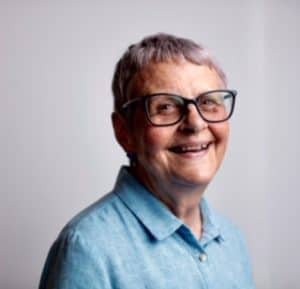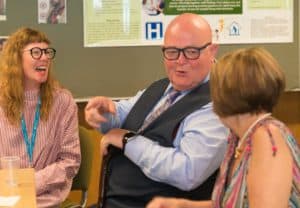Dementia under coronavirus lockdown: the moving accounts of those striving to be heard. University of Bradford helps give voice to people living with dementia during the coronavirus pandemic.
Moving accounts of how life under coronavirus lockdown has affected people living with dementia have been penned by those living with dementia and carers
The online archive – part of the University of Bradford’s Centre for Applied Dementia Studies – was viewed thousands of times in April alone.
For some, the ability to blog has become a lifeline. For others, the outpourings offer hope and comfort and the catharsis which comes through shared experience.
Wendy Mitchell’s emotive blog Which Me Am I Today? sums up the emptiness felt by many living with dementia during coronavirus lockdown.

“Before we entered this strange world we find ourselves in, I was used to travelling about, meeting new people in new environments, chatting to people all day long,” she says. “It was my sudoku, keeping dementia at bay, giving me something to fight it with but now that social interaction has disappeared.
“Talking to others is now a luxury. No longer am I starting off my day chatting to my taxi driver, chatting to fellow commuters, chatting to people at events and then all the way home in reverse. Sadly, this isn’t working in my favour as I’ve found myself having to concentrate so much when I do talk; have more problems word finding; find myself stuttering and grappling with words, my speech slowing down… a strange unexpected consequence I’d never considered.”
Wendy, who holds an honorary doctorate from the university and is an ‘Expert by Experience’, continues: “I suppose it can be compared to when I gave up typing for two weeks one Christmas and when I next opened my iPad I couldn’t remember what to do. I’ve never stopped typing since. Now I just find creeping signs of the same thing happening with talking.”
Mother-of-two Wendy, 58, was diagnosed with early onset Alzheimer’s in July 2014 and was at the time working in the NHS. She adds: “I’m hoping I can convey that, although we’ve been diagnosed, people like me still have a substantial contribution to make. We still have a sense of humour. We still have feelings. I’m hoping to show the reality of trying to cope on a day to day basis with the ever-changing environment that dementia throws at those diagnosed with the condition. What I want is not sympathy. What I want is simply to raise awareness.”
Another who well understands those frustrations is former long-distance lorry driver Michael Andrews, 60, who was diagnosed with posterior cortical atrophy (a rare form of dementia which affects his eyesight, visual perception and memory) in 2017.
Michael works closely with the University of Bradford as an ‘Expert by Experience’. A former soldier in the British Army, his life is now dominated by routines, but coronavirus lockdown has changed everything.
Read his blog here.
“A big part of my life was going out of the house,” he explains. “When I was first diagnosed, some things would confuse me and then what I call ‘the fog’ would descend. It means you can’t remember where you are or what you’re doing. Having routines helps to combat that. When I was in the Army, they used to say there’s no obstacle you can’t overcome. So, I’d go see people, have appointments, go for coffee and so on. But coronavirus has brought all that to an end.”
Thankfully, he is finding new activities to combat ‘the fog’. “I’m cooking a lot more, playing the flute and accordion and I’ve just started learning the alto saxophone, I also play chess. The coronavirus lockdown has been confusing for everyone but for anyone with dementia, it’s even more difficult.”
Asked about his work with the university, he said: “The University has been a great help and I’m happy to be involved in the research. You can read all the books you like but you cannot ask a book question, so sometimes it’s better to hear it from a person.”
The University of Bradford recently partnered with Exeter University to publish a leaflet offering advice for people living with dementia during coronavirus lockdown. It also launched a study to highlight the need to reopen dementia services as quickly as possible after lockdown ends.

Dementia care trainer in the Faculty of Health Studies Clare Mason, says the blogs help bring people together. “It’s another way of reaching people, a way of sharing experiences and that can help in terms of improving people’s well-being and other people’s understanding of dementia.”
Dr Ana Barbosa, interim programme leader on the MSc Advanced Dementia Studies Programme, says: “The blogs have been going for four years, usually with one every month but since Covid we have made a point of trying to do two a week. It’s a way to share what we do at the Centre. Bradford is well known around the world for its work on dementia.
“Since the outbreak people are more active on social media, so blogs are more important than ever. It’s a way to reach a lot of people and get immediate feedback.”
The University of Bradford’s Centre for Applied Dementia Studies is world renowned, thanks in part to the pioneering work done by the late Prof Thomas Kitwood (1937-1998), who developed the ‘person centred’ approach to care and ‘dementia care mapping’, which are recognised by the National Institute for Health and Care Excellence and are widely used across in the UK.
- Gut microbiome could delay onset of type 1 diabetes - 3rd April 2025
- The da Vinci 5 Robot Is Set To Transform Bariatric Care: - 31st March 2025
- Beyond money: the hidden drivers fuelling child food insecurity - 31st March 2025






